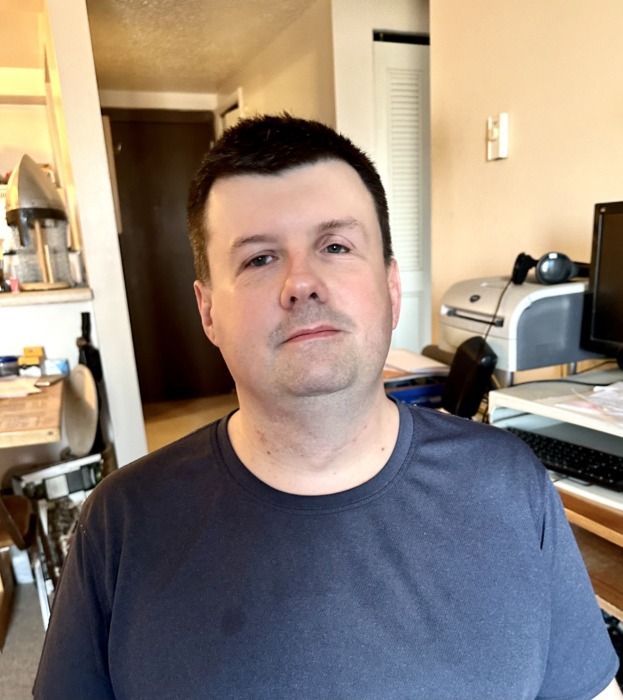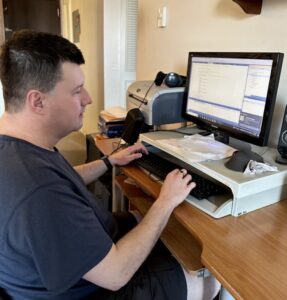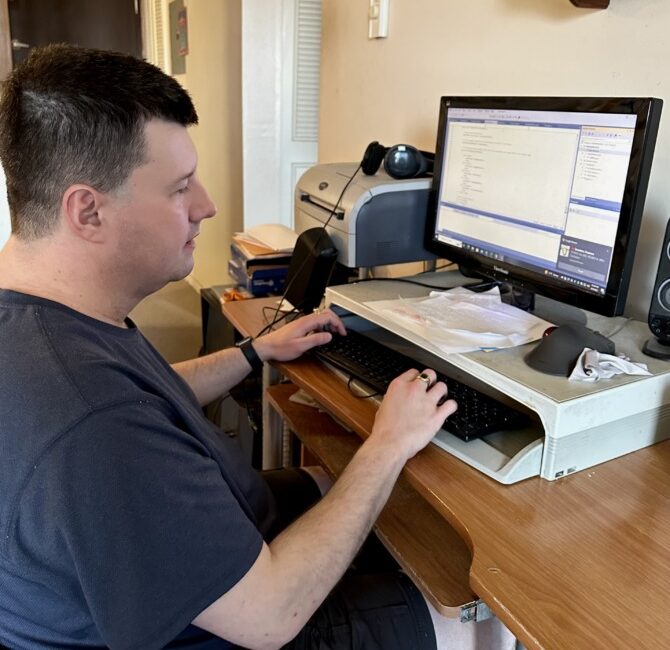 Justin Jones was born in Fort Wayne, Indiana. Justin’s dad was in the military, and the family moved often. Justin and his family spent a lot of his childhood in Texas, where he eventually graduated high school and went to college.
Justin Jones was born in Fort Wayne, Indiana. Justin’s dad was in the military, and the family moved often. Justin and his family spent a lot of his childhood in Texas, where he eventually graduated high school and went to college.
Justin was born with Peters anomaly, which is a genetic disorder of the eye. He had low vision when he was younger and could see colors and shapes. In kindergarten, he went to a traditional school and his visual impairment teacher taught him to read braille. He went to traditional schools all his life except for a year of schooling at the blind school in 4th grade. He eventually lost all his sight and had tools in place to learn through the visual impairment instructors he was assigned through school.
After graduating high school, Justin attended the University of Texas where he got an undergraduate and graduate degree in history. His goal was to work at a museum doing historical research. Since graduating, he has not had luck in finding a job pursuing that dream. He said, “I was naïve to think I could find a job doing this at a museum and could not find one.” His grandmother encouraged him to move back to Fort Wayne to look for a job in a museum, but he did not have luck in Fort Wayne either.
Throughout high school, he worked with the Division for Blind Services in Texas and when he moved back to Indiana, he received orientation & mobility training that was provided through Vocational Rehabilitation. Vocational Rehabilitation (VR) is a state agency that provides services that assist individuals with disabilities in obtaining or maintain employment. During this time, Justin’s interests turned toward creating video games for individuals who are blind. He had been using JAWS computer screen reader for years, but needed some updates and Vocational Rehabilitation referred him to Easterseals Crossroads for an assistive technology evaluation to assist him with JAWS updates and to determine any other needs he may have to pursue his employment goals. An assistive technology is a one-on-one evaluation to determine the appropriate assistive technology to meet someone’s needs at home, work, school, or in the community.
Jim Rinehart, Assistive Technology Specialist, at Easterseals Crossroads came to Justin’s home and assisted him in getting JAWS upgraded and assessed his other needs to address any barriers in gaining employment. He recommended technology solutions that could help him access printed material and to take notes during meetings. Justin said, “I got other technology that I wish I had known about sooner. It would have made my life so much easier. Jim helped me set up an iPhone and iPad and trained me on all the built-in accessibility features like Voice Over. He also recommended an OCR scanner that had OCR office software so I could access printed materials and a braille notetaker, which “is so helpful for me to take to business meetings with lawyers and accountants so I can take notes during the meeting. I use my iPhone for so many things for work and personally. Since working with Jim, I now use Seeing AI, Voice Over, navigation apps, text-to-speech to send text messages, BARD to listen to books, and a light detector to see if I have left any lights on.”
technology solutions that could help him access printed material and to take notes during meetings. Justin said, “I got other technology that I wish I had known about sooner. It would have made my life so much easier. Jim helped me set up an iPhone and iPad and trained me on all the built-in accessibility features like Voice Over. He also recommended an OCR scanner that had OCR office software so I could access printed materials and a braille notetaker, which “is so helpful for me to take to business meetings with lawyers and accountants so I can take notes during the meeting. I use my iPhone for so many things for work and personally. Since working with Jim, I now use Seeing AI, Voice Over, navigation apps, text-to-speech to send text messages, BARD to listen to books, and a light detector to see if I have left any lights on.”
With all these technologies in place, Justin has been working on building video games for people who are blind with his business partner in the UK through their company Ebon Sky Studios. He said, “I am creative, and he is good at programing. We are interested in creating role playing games. In the past when you created games, you had to do it from the ground up. You had to do everything by hand, such as creating the sound or the graphics. Now there are engines available where the fundamental stuff is there. It’s like a template for creating games, but a much more flexible template. My partner and I are working on creating an engine specifically for blind people to use so they can create their own games. We had a descent system put together and a game to go along with it, but there was a memory leak. We couldn’t fix the memory leak so we were not able to release that program so we are working on coming up with another system with our focus on making sure the platform will be compatible with JAWs and other screen readers. The idea is a library series of pre-built, pre-coded assist systems to fully integrate screen readers into your system you are using to make games.”
Justin shared that he is learning to ask for help as he learned so many helpful tools that he was not aware of before working with Jim. He said, “I’ve learned from going to school and working with disability providers such as Easterseals Crossroads that you just need to ask for help when you need it and not be afraid to ask for help. I sometimes struggle with this, but I realize people can’t help you if they don’t know you need help or understand how to help you, if you don’t tell them what you need. Using assistive technology can help you adapt to real world situations that are created for people with sight and the technology can help you adapt to those situations and help you not be isolated from everyone else. I learned about technology that I didn’t even know existed that allows me to have more socialization and to work independently. If someone has a visual impairment and not using assistive technology, I would ask them why they are not and encourage them to learn what is out there. It opens up your world and most people are happy to help.”
Justin shared a little of his assistive technology evaluation experience and the advice he has for others. Check it out here:
Click here for more information on assistive technology evaluations.

